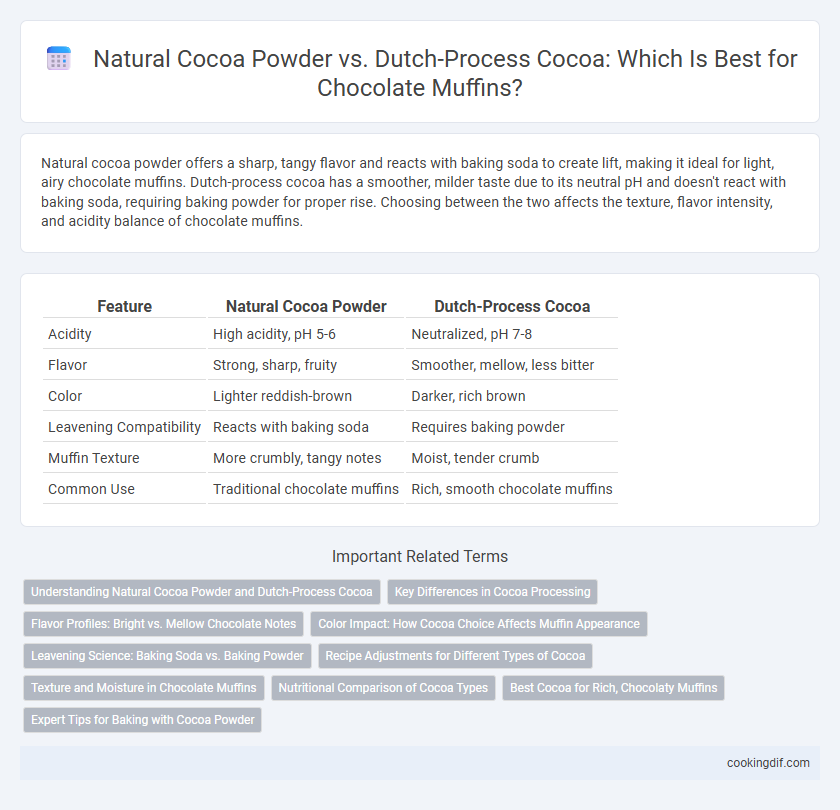Natural cocoa powder offers a sharp, tangy flavor and reacts with baking soda to create lift, making it ideal for light, airy chocolate muffins. Dutch-process cocoa has a smoother, milder taste due to its neutral pH and doesn't react with baking soda, requiring baking powder for proper rise. Choosing between the two affects the texture, flavor intensity, and acidity balance of chocolate muffins.
Table of Comparison
| Feature | Natural Cocoa Powder | Dutch-Process Cocoa |
|---|---|---|
| Acidity | High acidity, pH 5-6 | Neutralized, pH 7-8 |
| Flavor | Strong, sharp, fruity | Smoother, mellow, less bitter |
| Color | Lighter reddish-brown | Darker, rich brown |
| Leavening Compatibility | Reacts with baking soda | Requires baking powder |
| Muffin Texture | More crumbly, tangy notes | Moist, tender crumb |
| Common Use | Traditional chocolate muffins | Rich, smooth chocolate muffins |
Understanding Natural Cocoa Powder and Dutch-Process Cocoa
Natural cocoa powder contains higher acidity and imparts a sharp, fruity flavor to chocolate muffins, reacting with baking soda to provide rise and light texture. Dutch-process cocoa is alkalized, resulting in milder, smoother chocolate notes and neutral pH, requiring baking powder for proper leavening in muffins. Understanding these differences helps bakers select the right cocoa type to achieve desired flavor profiles and texture in chocolate muffins.
Key Differences in Cocoa Processing
Natural cocoa powder is acidic and retains a sharp, robust chocolate flavor, making it ideal for recipes using baking soda as a leavening agent. Dutch-process cocoa is treated with an alkalizing agent, resulting in a milder, smoother taste and a darker color, which pairs well with baking powder. The choice between the two significantly impacts the texture, acidity balance, and overall flavor profile of chocolate muffins.
Flavor Profiles: Bright vs. Mellow Chocolate Notes
Natural cocoa powder delivers bright, tangy chocolate notes with a slightly acidic bite, enhancing the complexity and depth of chocolate muffins. Dutch-process cocoa offers a smoother, mellower flavor with subtle earthiness and reduced acidity, resulting in rich, balanced chocolate undertones. Selecting natural cocoa emphasizes vibrant, intense chocolate flavors, while Dutch-process yields soft, rounded chocolate nuances perfect for tender, moist muffins.
Color Impact: How Cocoa Choice Affects Muffin Appearance
Natural cocoa powder creates chocolate muffins with a lighter reddish-brown color due to its higher acidity and unprocessed nature. Dutch-process cocoa, treated with alkaline, produces a darker, richer brown muffin, giving a more intense chocolate appearance. The choice between these cocoa types significantly influences the visual appeal and perceived flavor depth of chocolate muffins.
Leavening Science: Baking Soda vs. Baking Powder
Natural cocoa powder's acidity reacts with baking soda to produce carbon dioxide, essential for muffin rise and light texture. Dutch-process cocoa is neutral, requiring baking powder as a leavening agent to achieve proper lift. Choosing the correct cocoa and leavening combination ensures optimal muffin volume and crumb structure.
Recipe Adjustments for Different Types of Cocoa
Natural cocoa powder in chocolate muffin recipes reacts with baking soda to create leavening, making the batter rise and creating a lighter texture. Dutch-process cocoa is neutralized and does not react with baking soda, requiring baking powder or a baking soda and acid combination for proper leavening. Adjusting the leavening agents based on the type of cocoa used ensures optimal muffin texture and flavor balance.
Texture and Moisture in Chocolate Muffins
Natural cocoa powder tends to create a lighter texture with a slightly tangy flavor in chocolate muffins, while Dutch-process cocoa imparts a smoother, richer taste and deeper color. Dutch-process cocoa, being alkalized, enhances moisture retention, resulting in a denser and moister crumb compared to the drier texture often found in muffins made with natural cocoa. Bakers seeking a tender, moist muffin typically prefer Dutch-process cocoa for its ability to balance flavor intensity with superior moisture levels.
Nutritional Comparison of Cocoa Types
Natural cocoa powder contains higher acidity and retains more antioxidants like flavonoids, which contribute to its robust flavor and potential health benefits. Dutch-process cocoa is alkalized, resulting in a smoother taste and darker color but with reduced antioxidant levels and slightly lower acidity. Nutritionally, both types are low in calories and fats, but natural cocoa offers more beneficial phytochemicals that support heart health compared to Dutch-process cocoa.
Best Cocoa for Rich, Chocolaty Muffins
Dutch-process cocoa delivers a smoother, less acidic flavor due to its alkalized treatment, making it the best choice for rich, chocolaty muffins with deep color and mellow taste. Natural cocoa powder, while more acidic and intense, reacts well with baking soda to create a lighter crumb but may produce a tangier flavor. For dense, moist muffins with a pronounced chocolate richness, Dutch-process cocoa offers superior texture and taste.
Expert Tips for Baking with Cocoa Powder
Using natural cocoa powder in chocolate muffins results in a tangier, brighter flavor due to its acidic nature, which reacts with baking soda for proper leavening. Dutch-process cocoa, treated with an alkalizing agent, offers a smoother, milder taste and darker color, but requires baking powder for leavening because it neutralizes acidity. Expert bakers recommend matching the cocoa type with the leavening agent and adjusting recipe acidity to achieve optimal muffin texture and flavor.
Natural cocoa powder vs Dutch-process cocoa for chocolate muffins Infographic

 cookingdif.com
cookingdif.com